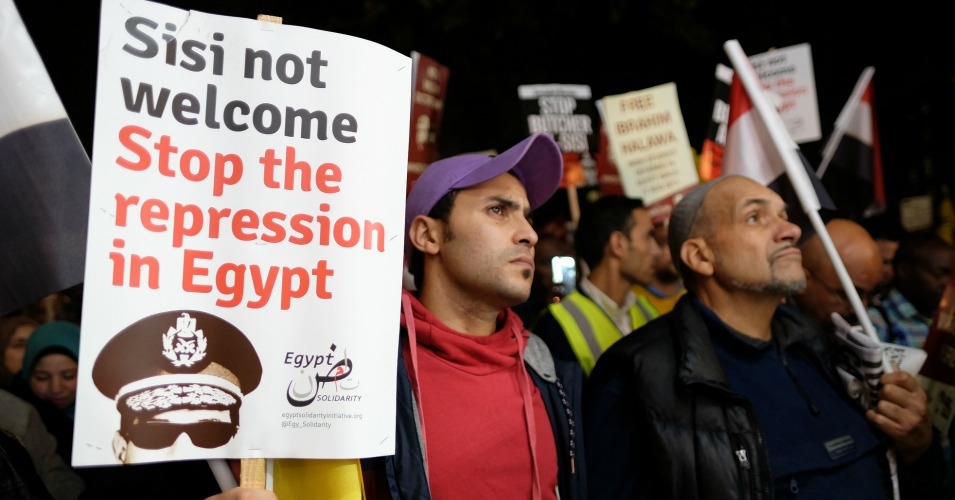2015: When Global Governments Trampled Human Rights in Name of National Security
HUMAN RIGHTS, 7 Mar 2016
Andrea Germanos – Common Dreams
Rights ‘are being treated with utter contempt by many governments around the world.’

Protesters in London take part in a November 2015 action to protest a visit by Egypt’s president Abdel Fattah al-Sisi. (Photo: Alisdare Hickson/flickr/cc)
24 Feb 2016 – Governments worldwide in 2015 capitalized on supposed national security threats to trample over human rights.
That’s Amnesty International’s assessment of global human rights in its latest report.
“Your rights are in jeopardy: they are being treated with utter contempt by many governments around the world,” said Salil Shetty, Secretary General of Amnesty International.
Driving some of the government attacks on human rights are “misguided reactions… to national security threats,” including “the crushing of civil society, the right to privacy and the right to free speech; and outright attempts to make human rights dirty words, packaging them in opposition to national security, law and order and ‘national values.’ Governments have even broken their own laws in this way,” he continued.
“Millions of people are suffering enormously at the hands of states and armed groups, while governments are shamelessly painting the protection of human rights as a threat to security, law and order or national ‘values.'”
Looking at abuses “by the numbers,” the watchdog group found that:
- At least 122 countries tortured or otherwise ill-treated people;
- At least 30 or more countries illegally forced refugees to return to countries where they would be in danger;
- Over 60 million people were displaced from their homes;
- At least 113 countries arbitrarily restricted freedom of expression and the press; and
- At least 156 human rights defenders died in detention or were killed.
In addition to rights and rights defenders being under attack, so “are the laws and the system that protect them,” Shetty said.
The new report covers a wide range of abuses, such as Ireland’s restrictions on and criminalization of abortion and Australia’s disproportionate jailing of Indigenous people and its denial of rights to asylum-seekers.
The United States and some of its allies fared poorly as well.
Saudi Arabia continued its crackdown on freedom of expression and association, locked up human rights defenders, and tortured prisoners. Women also faced discrimination by law and lacked protections from sexual and other violence.
Israel continued its “military blockade of Gaza and therefore collective punishment of the 1.8 million inhabitants there.”
The UK repealed its Human Rights Act and pushed forth surveillance laws. “The UK is setting a dangerous precedent to the world on human rights,” said Amnesty International UK Director Kate Allen.
And Egypt arrested thousands “in a ruthless crackdown in the name of national security.”
As for rights abuses in the U.S., the report states:
There was no accountability nor remedy for crimes under international law committed in the secret detention program operated by the CIA. Scores of detainees remained in indefinite military detention at the US naval base at Guantánamo Bay in Cuba, while military trial proceedings continued in a handful of cases. Concern about the use of isolation in state and federal prisons and the use of force in policing continued. Twenty-seven men and one woman were executed during the year.
“President Obama has often said the right thing but failed to turn his rhetoric into an agenda that makes human rights, in fact, a national priority,” said Margaret Huang, interim executive director of Amnesty International USA.
While numerous abuses are cataloged, Shetty stresses in the foreward that the report “cannot convey the full human misery of the topical crises of this last year, notably the refugee crisis—even now exacerbated in this northern winter. In such a situation, protecting and strengthening systems of human rights and civilian protection cannot be seen as optional.
“It is literally a matter of life and death.”
______________________________________
This work is licensed under a Creative Commons Attribution-Share Alike 3.0 License
Go to Original – commondreams.org
DISCLAIMER: The statements, views and opinions expressed in pieces republished here are solely those of the authors and do not necessarily represent those of TMS. In accordance with title 17 U.S.C. section 107, this material is distributed without profit to those who have expressed a prior interest in receiving the included information for research and educational purposes. TMS has no affiliation whatsoever with the originator of this article nor is TMS endorsed or sponsored by the originator. “GO TO ORIGINAL” links are provided as a convenience to our readers and allow for verification of authenticity. However, as originating pages are often updated by their originating host sites, the versions posted may not match the versions our readers view when clicking the “GO TO ORIGINAL” links. This site contains copyrighted material the use of which has not always been specifically authorized by the copyright owner. We are making such material available in our efforts to advance understanding of environmental, political, human rights, economic, democracy, scientific, and social justice issues, etc. We believe this constitutes a ‘fair use’ of any such copyrighted material as provided for in section 107 of the US Copyright Law. In accordance with Title 17 U.S.C. Section 107, the material on this site is distributed without profit to those who have expressed a prior interest in receiving the included information for research and educational purposes. For more information go to: http://www.law.cornell.edu/uscode/17/107.shtml. If you wish to use copyrighted material from this site for purposes of your own that go beyond ‘fair use’, you must obtain permission from the copyright owner.